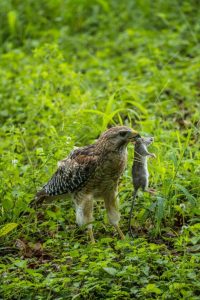Dangers of Rodenticides
What are SGARs?
Second-Generation Anticoagulant Rodenticides (SGARs) are a type of poison commonly used to control rodent populations. Unlike other rodenticides, SGARs are more potent and persist longer in the bodies of animals that consume them. When rodents ingest SGARs, they do not die immediately. Instead, they may continue to move around for days before succumbing to internal bleeding caused by the chemicals, often ending up far away from where they ingested the poison.
The Dangers to Raptors and Other Predators
The extended weakened state of rodents exposed to SGARs increases the likelihood that they will be eaten by predatory birds and mammals. Because SGARs persist in the bodies of poisoned rodents, any predator that consumes them can accumulate lethal levels of the toxin. Raptors such as hawks, owls, and eagles, as well as mammals like foxes, bobcats, and coyotes, are all at risk. Domestic cats and dogs are also susceptible to SGAR poisoning.
Documented Effects on Wildlife
Studies in Massachusetts and across the U.S. have shown widespread exposure of raptors to SGARs. Necropsies of dead hawks and owls frequently reveal internal bleeding and high concentrations of these poisons. Even when exposure does not lead to immediate death, sublethal doses can weaken predators, making them more susceptible to disease, starvation, and vehicle collisions.
Why This Matters for Local Ecosystems
Raptors and other predators play a critical role in maintaining balanced ecosystems by naturally controlling rodent populations. When these species decline due to poisoning, rodent populations can surge, leading to increased human-wildlife conflicts and greater demand for rodent control methods—potentially perpetuating a cycle of poison use.
Safer Alternatives for Rodent Control
To protect raptors and other wildlife, residents and businesses can take steps to control rodents without the use of SGARs:
- Eliminate food sources: Secure trash, compost, and pet food to reduce rodent attractants.
- Seal entry points: Prevent rodents from entering buildings by sealing cracks and gaps.
- Use snap traps: Well-placed snap traps provide an effective and humane method of rodent control.
- Encourage natural predators: Installing owl boxes and maintaining open spaces can support local raptor populations, which help keep rodent numbers in check.
- Choose less harmful rodenticides: If rodenticides must be used, opt for first-generation anticoagulants or non-anticoagulant options such as corn gluten meal that break down more quickly and pose less risk to wildlife.
Get Involved
If you find a dead or sick raptor and suspect rodenticide poisoning, contact a local wildlife rehabilitation center or the Massachusetts Division of Fisheries and Wildlife. Information on both can be found here. Reporting incidents helps track the impact of SGARs and informs conservation efforts.
By reducing reliance on SGARs, we can help protect the raptors and other predators that are essential to our local ecosystems.

